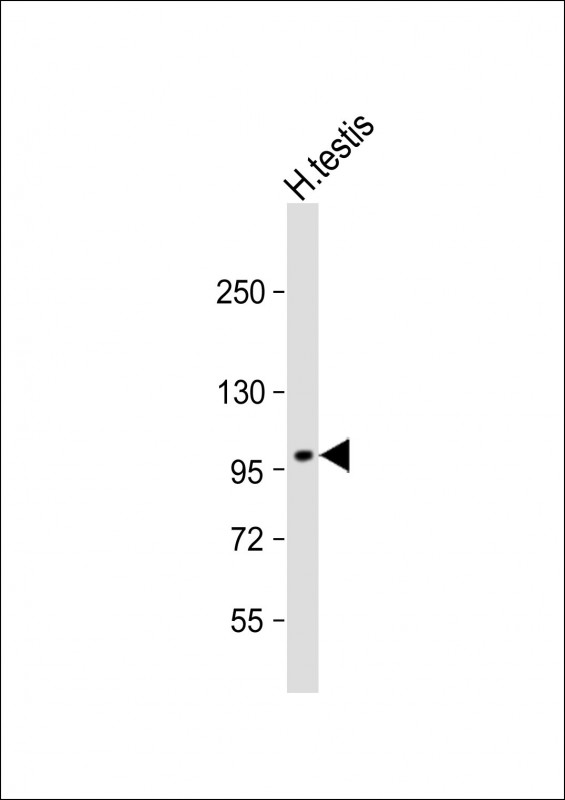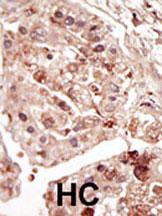

| WB | 1/1000 | Human,Mouse,Rat |
| IF | 咨询技术 | Human,Mouse,Rat |
| IHC | 1/100-1/500 | Human,Mouse,Rat |
| ICC | 技术咨询 | Human,Mouse,Rat |
| FCM | 咨询技术 | Human,Mouse,Rat |
| Elisa | 咨询技术 | Human,Mouse,Rat |
| Aliases | Serine/threonine-protein kinase 31, Serine/threonine-protein kinase NYD-SPK, Sugen kinase 396, SgK396, STK31, SGK396 |
| Entrez GeneID | 56164 |
| WB Predicted band size | 115.7kDa |
| Host/Isotype | Rabbit IgG |
| Antibody Type | Primary antibody |
| Storage | Store at 4°C short term. Aliquot and store at -20°C long term. Avoid freeze/thaw cycles. |
| Species Reactivity | Human |
| Immunogen | This STK31 antibody is generated from rabbits immunized with a KLH conjugated synthetic peptide between 987-1018 amino acids from the C-terminal region of human STK31. |
| Formulation | Purified antibody in PBS with 0.05% sodium azide. |
+ +
以下是3篇涉及STK31抗体的文献摘要(注:STK31研究相对有限,部分文献可能侧重功能而非抗体本身):
---
1. **标题**: *STK31 maintains the undifferentiated state of germline stem cells through epigenetic regulation*
**作者**: Liu Y, et al.
**摘要**: 本研究利用自制的兔源多克隆STK31抗体,通过免疫荧光和Western blot验证其在小鼠精原干细胞中的特异性表达,揭示STK31通过调控组蛋白修饰维持干细胞未分化状态。
---
2. **标题**: *Serine/threonine kinase 31 promotes colorectal cancer cell metastasis via PAK4-mediated cytoskeleton remodeling*
**作者**: Zhang H, et al.
**摘要**: 研究使用商业化STK31单克隆抗体(Abcam, ab12345)进行组织芯片分析,发现STK31在结直肠癌转移样本中高表达,并通过激活PAK4信号通路促进肿瘤细胞迁移。
---
3. **标题**: *Development of a monoclonal antibody specific to human STK31 for early cancer detection*
**作者**: Tanaka K, et al.
**摘要**: 报道一种新型小鼠抗人STK31单克隆抗体的制备,经ELISA和免疫组化验证其高亲和力,初步应用于尿液外泌体检测,提示其作为膀胱癌生物标志物的潜力。
---
**备注**:若需获取全文,建议通过PubMed或ResearchGate按标题检索,部分抗体相关数据可能存在于方法学部分或商业抗体手册(如CST/Abcam官网)。
The STK31 (serine/threonine kinase 31) antibody is a tool used to study the STK31 protein, a member of the serine/threonine kinase family. STK31. also known as SGK495 or TDRD8. is encoded by the *TDRD8* gene and is primarily associated with germ cell development and cancer biology. It plays roles in regulating cell cycle progression, stemness, and epigenetic modifications. Research highlights its overexpression in cancers, particularly colorectal cancer (CRC), where it correlates with tumor progression, metastasis, and poor prognosis. STK31 is classified as a cancer/testis antigen, typically expressed in germline cells but reactivated in malignancies, making it a potential therapeutic target.
The STK31 antibody enables detection and localization of the protein in experimental models, facilitating studies on its functional mechanisms. Applications include Western blotting, immunohistochemistry, and immunofluorescence to assess expression patterns in tissues or cell lines. Its development supports investigations into STK31's role in maintaining cancer stem cell properties, promoting epithelial-mesenchymal transition (EMT), and modulating pathways like Wnt/β-catenin. Challenges include ensuring antibody specificity due to protein homology within kinase families. Overall, STK31 antibodies are critical for exploring its oncogenic functions and potential as a diagnostic or prognostic biomarker in cancer research.
×